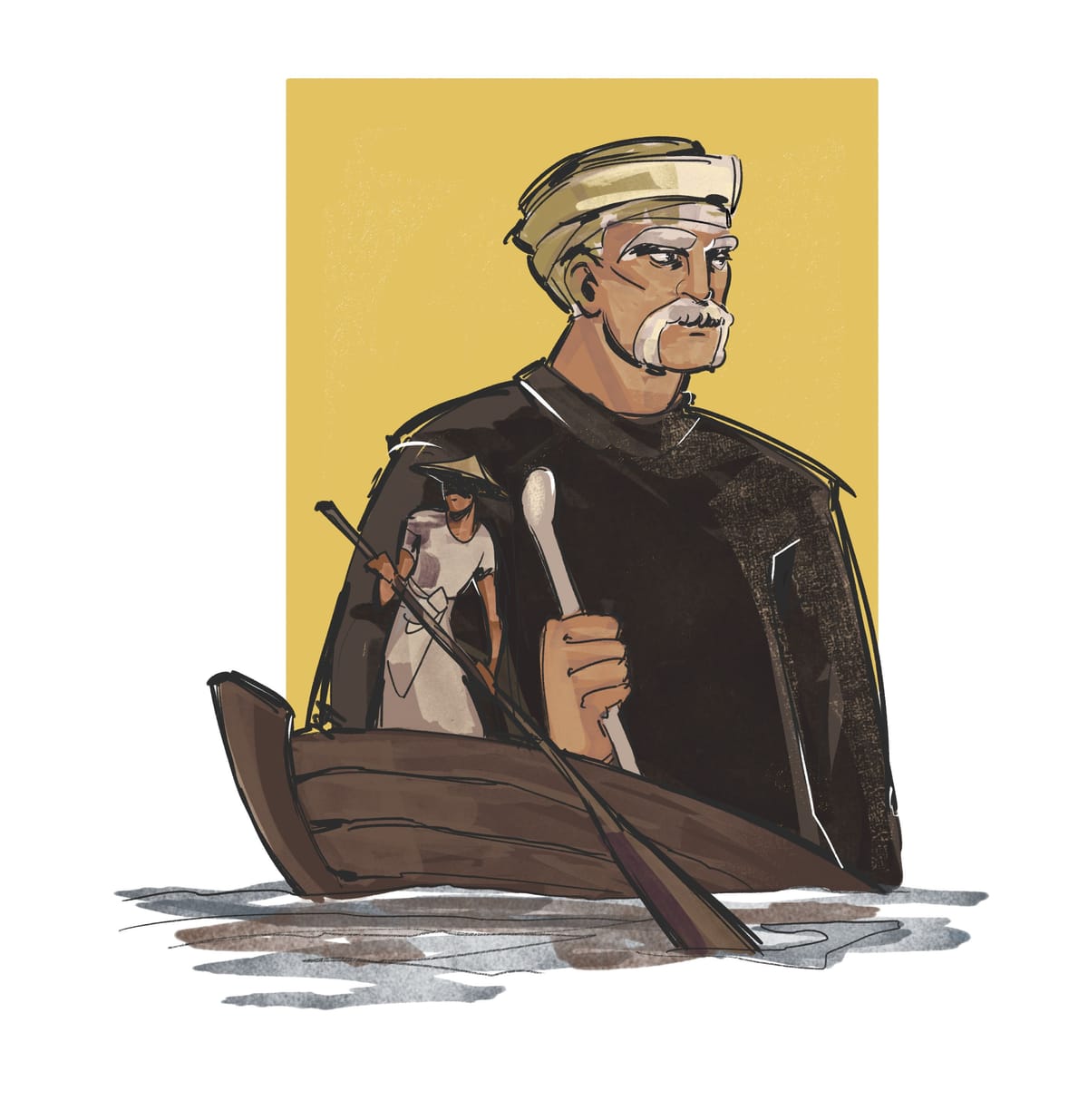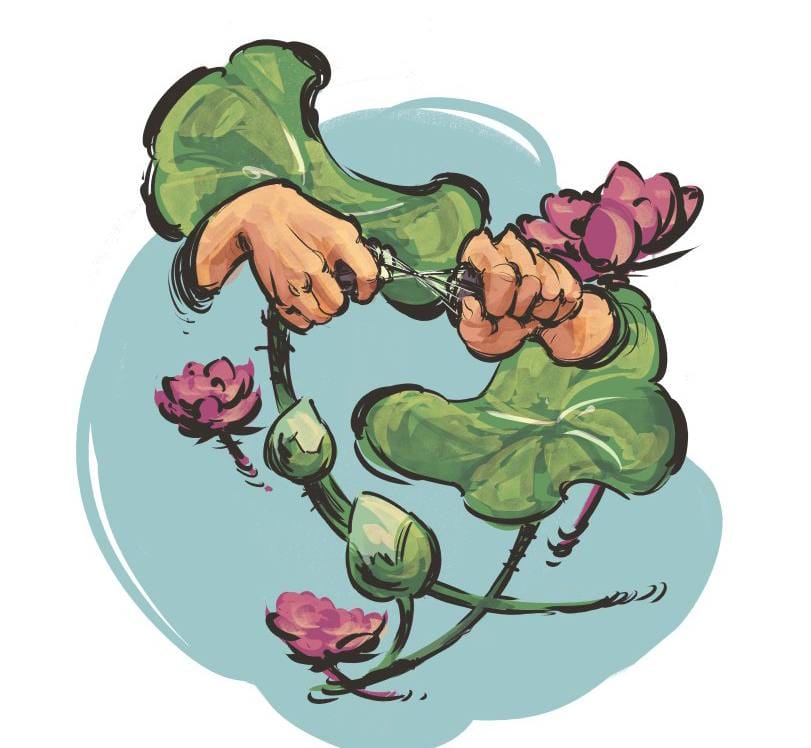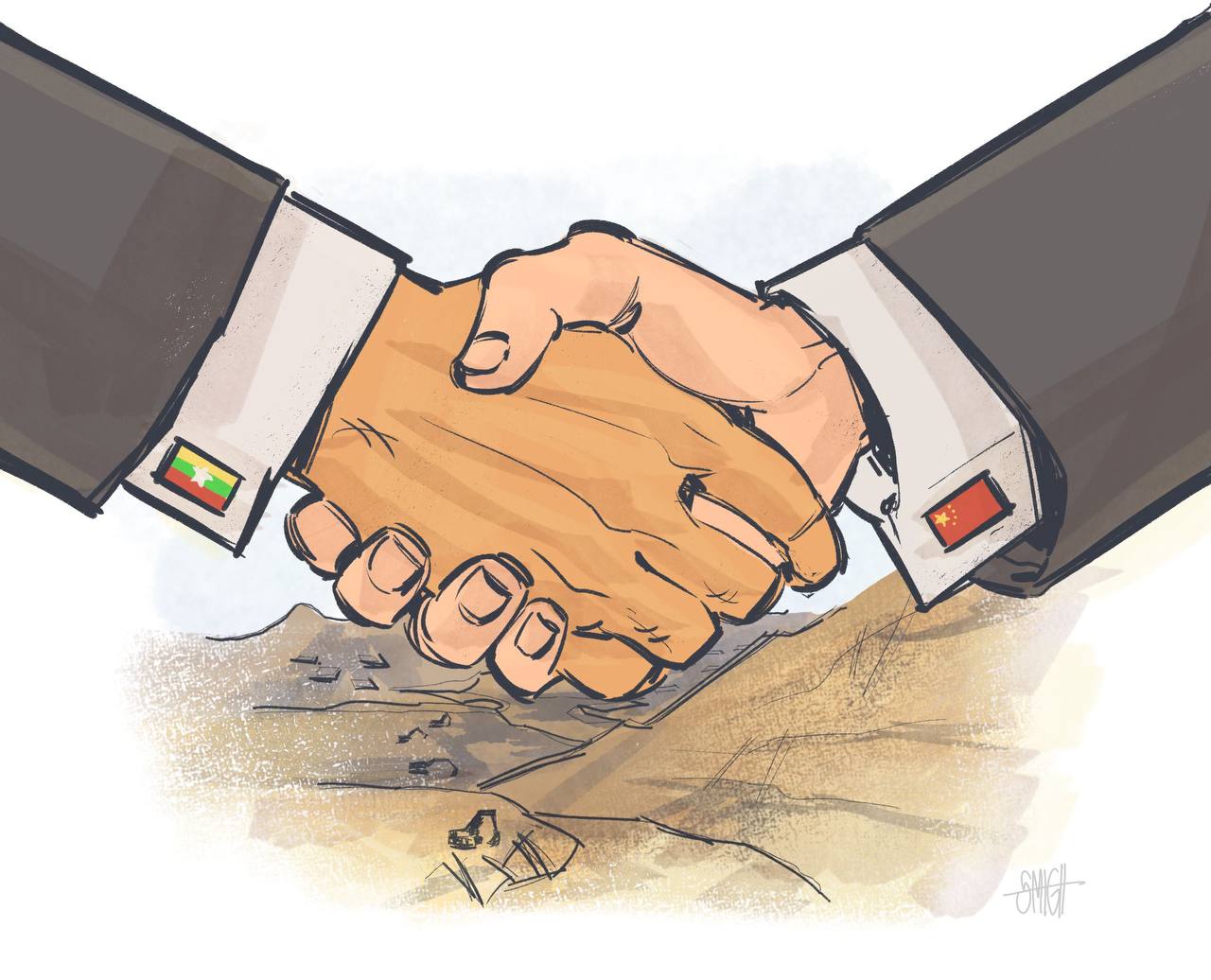
It's hard to believe that the founder of the first bank owned by Myanmar's indigenous people was not born in Myanmar. But it's true. The founder of the first indigenous-owned bank in Myanmar was a Rakhine man born in Bangladesh. He was also a pioneer entrepreneur of his time, with a keen eye for business opportunities.
The year was 1833, 9 years after the First Anglo-Burmese War.
A young man was born in the impoverished village of Pingtalay in Patuakhali, Bangladesh. He had two older brothers and one younger brother, being the third son. His parents were poor. When the young man came of age, he took his younger brother's hand and set out on an adventure to improve their lives, heading to the neighboring country of Myanmar. More accurately, they headed to Sittwe in Rakhine State, Myanmar.
At that time, Bangladesh was poorer than Myanmar. Although we say Bangladesh, it wasn't yet an independent country but still part of India. When India gained independence, Pakistan split off. Pakistan then had East Pakistan and West Pakistan, and after further conflicts and wars, East Pakistan became Bangladesh.
Bangladesh and Rakhine State share a border and have had interactions. Since ancient times, Rakhine kings had ruled parts of Bangladesh. When Rakhine people faced dangers for various reasons, they often sought refuge in Bangladesh. The young man's parents were also Myanmar citizens from Sittwe, Rakhine State, who had ended up in Bangladesh.
The young man who now set out for Sittwe was named U Ye Kyaw Thu. He bravely left for Sittwe with his younger brother, Aung Shwe. U Ye Kyaw Thu knew nothing about Sittwe except that it had many educated and wealthy people. He had never been there before. When U Ye Kyaw Thu left, his parents were so poor that they could only give their two sons a small amount of money and a package of dried fish.
With a little money and a package of dried fish, the brothers arrived in Rakhine and started looking for work. U Ye Kyaw Thu's younger brother couldn't find work and returned to Bangladesh. Only U Ye Kyaw Thu remained in Rakhine, struggling to make a living.
Before U Ye Kyaw Thu arrived in Rakhine, there was a wealthy man named U San Chwe in Sittwe. His boats traveled to various islands, trading goods. U Ye Kyaw Thu started working as a boatman on U San Chwe's boat. The trading boat would travel from island to island, village to village, selling and buying goods, often docking at various places. U Ye Kyaw Thu was diligent and hardworking. While other boatmen would gather and chat after dinner, U Ye Kyaw Thu would take a short nap. When the other boatmen went to bed, U Ye Kyaw Thu would inspect the boat alone. He would check the tides, examine the ropes tying the boat, pump out water from the hull, check the arrangement of goods, and assess the weather. Then he would sleep briefly before waking up at 4 AM to inspect the boats again. He did this regularly on his own.
Due to his diligence and keen eye for work, U Ye Kyaw Thu became his employer's trusted right-hand man. Following the tradition of elders in those days, when they found someone trustworthy, they would choose them as a family member to help grow their wealth. So, the wealthy man planned to arrange a marriage between his daughter, Than Da Phyu, and U Ye Kyaw Thu. Although Than Da Phyu objected, according to Rakhine custom at that time, children had no right to refuse their parents' arrangements. Thus, U Ye Kyaw Thu became U San Chwe's son-in-law. U Ye Kyaw Thu's business acumen can be seen in how he reinvested the wedding gifts they received as shares in his father-in-law's business.
At this point, one might think U Ye Kyaw Thu's story is like a typical Myanmar movie plot where a poor man marries a rich man's daughter and becomes wealthy. But that's not the case. He faced many challenges and difficulties in his life.
After getting married, U Ye Kyaw Thu established his own businesses alongside working for his father-in-law. One day, a ship carrying teak arrived in Sittwe. U Ye Kyaw Thu bought all the teak. Needing money to buy more teak that was expected to arrive, he borrowed money from his wife's relatives. Then he bought more teak. However, the teak didn't sell as he had expected. U Ye Kyaw Thu, not losing hope, stayed at the monastery where the teak was stored, waiting for buyers without returning home. Unexpectedly, when some rice warehouses owned by the British caught fire, his teak sold, and he made about 20 times his investment.
U Ye Kyaw Thu also traded with Bangladesh, his birthplace. On the return trip from Bangladesh, when bringing tobacco leaves, the sea voyage encountered big waves, and the tobacco got soaked with salt water. When it seemed the wet tobacco might be unsellable, U Ye Kyaw Thu didn't give up. He dried the tobacco on bamboo racks and then shipped it to Mawlamyine for sale. When it sold out quickly in Mawlamyine, he sold it in Rakhine too. In Rakhine, it became known as betel nut chewing tobacco.
U Ye Kyaw Thu spent his whole life actively seeking opportunities. At that time, merchants from Bangladesh used to come to Sittwe to buy goods in large wooden boats. On their way to Sittwe, the boats were too light without cargo, making the sea journey difficult. Mainly, when the wind blew, the lightness of the boats caused delays in reaching their destination. So, they would bring sand from the Bangladesh side.
Always looking for work and opportunities, U Ye Kyaw Thu bought all this sand arriving in Sittwe and had it piled up on the banks of the Kaladan River. Then he opened a sand depot and started trading. As Sittwe, a trading town, developed, U Ye Kyaw Thu's sand became so in demand that he could barely keep up with sales.
U Ye Kyaw Thu also traded rice on a large scale. When buying, he often offered higher prices than big capitalist companies. As a result, even large companies like Steel Brothers had to come and negotiate with U Ye Kyaw Thu to buy rice at the same price he was paying.
During such negotiations, U Ye Kyaw Thu skillfully avoided direct confrontation with the big companies. He well understood that given the circumstances of the time, he couldn't compete directly with the large capitalist companies in business. So when the big companies came to negotiate, he didn't oppose them openly, but according to some records, he would secretly offer higher prices and buy without the knowledge of the big companies.
Despite becoming wealthy, U Ye Kyaw Thu never forgot his roots, according to Rakhine oral history. It's said that he had a golden oar hanging on the wall of his grand house. This symbolized that he had become a wealthy man from being a boatman, serving as a reminder to himself not to forget his past.
As U Ye Kyaw Thu gradually became prominent, the British government planned to award him the honorary title of Thwe Thauk Gyi (Golden Chain). U Ye Kyaw Thu and a woman from India received the Thwe Thauk Gyi title from the British government. This title was given to famous, prominent people who could donate generously and those who served the country under British rule. U Ye Kyaw Thu received this honor.
At the time when U Ye Kyaw Thu was becoming prominent, Myanmar's banking sector was in its early stages. Myanmar was under British rule and was administered as part of India. Therefore, Myanmar's banking sector operated under the Indian Central Bank.
At this time, U Ye Kyaw Thu established a money lending company called "U Ye Kyaw Thu & Company Limited" in Sittwe. While this wasn't a bank, it was the first company to engage in money lending business in Myanmar at that time. His money lending business, with a capital of 10 million Indian Rupees, was established entirely with his own funds, without any foreign shareholding. Because of this, Myanmar records consider U Ye Kyaw Thu & Company Limited as the first indigenous-owned bank in Myanmar.
The bank lent money to farmers and those in need. However, U Ye Kyaw Thu's bank only provided loans against collateral. Farmers had to mortgage their fields or farms to get loans. Because of this, some later foreign scholars' records mention that the loans from U Ye Kyaw Thu's bank had high interest rates and were only given against collateral.
However, this was a time when Indian Chettiars were also very active, so locals preferred to mortgage their properties with U Ye Kyaw Thu's bank. Even if they couldn't redeem their property, they preferred to lose it to U Ye Kyaw Thu's bank rather than to the Chettiars. U Ye Kyaw Thu himself was a famous wealthy man in the town, known for building pagodas, donating to monasteries, and other charitable acts. This was also a time of strong patriotism and ethnic pride. For these reasons, U Ye Kyaw Thu's bank was quite successful.
As U Ye Kyaw Thu's wealth grew, he donated an ordination hall and bronze statues to the Mahamuni Buddha Temple in Kyauktaw. He also donated a maternity ward to Sittwe Hospital. Similarly, he bought timber to build a monastery called Than Kyaung in Sittwe. However, before the monastery could be built, U Ye Kyaw Thu passed away in 1910. After his death, his children worked together to fulfill his wish, and the Than Kyaung monastery can still be seen in Sittwe today.
About 14 years after his death, in 1924, his seventh son, U Shwe Tha, formally established U Ye Kyaw Thu & Company Limited as a proper banking business. However, the bank that U Ye Kyaw Thu had sown the seeds for didn't leave a record of remarkable success during the British era. Nevertheless, it did achieve the distinction of being an indigenous-owned pioneering banking business established in British-controlled Myanmar.
U Ye Kyaw Thu and Daw Than Da Phyu had 10 children. Four of them became prominent in Myanmar. U Ye Kyaw Thu's eldest son, U Chan Htoon, became a distinguished legal scholar. All four of U Ye Kyaw Thu's sons studied law in England.
U Ye Kyaw Thu started his life from the very bottom. He came from a foreign land to Sittwe and engaged in pioneering businesses. Although he himself wasn't highly educated, he was able to send his children to study even in England and support them to become prominent figures. He himself managed to make history as the founder of the first indigenous-owned banking business in Myanmar.
Han Thit Eain (Y3A)
Read More:
 Build Myanmar - MediaY3A
Build Myanmar - MediaY3A
 Build Myanmar - MediaY3A
Build Myanmar - MediaY3A
Build Myanmar-Media : Insights | Empowering Myanmar Youth, Culture, and Innovation
Build Myanmar-Media Insights brings you in-depth articles that cover the intersection of Myanmar’s rich culture, youth empowerment, and the latest developments in technology and business.
Sign up for Build Myanmar - Media
Myanmar's leading Media Brand focusing on rebuilding Myanmar. We cover emerging tech, youth development and market insights.
No spam. Unsubscribe anytime.
Sign up now to get the latest insights directly to your mailbox from the Myanmar's No.1 Tech and Business media source.
📅 New content every week, featuring stories that connect Myanmar’s heritage with its future.
📰 Explore more:
- Website: https://www.buildmyanmarmedia.com/
- Facebook: https://www.facebook.com/buildmyanmar
- YouTube: https://youtube.com/@buildmyanmarmedia
- Telegram: https://t.me/+6_0G6CLwrwMwZTIx
- Inquiry: info@buildmyanmar.org
#BuildMyanmarNews #DailyNewsMyanmar #MyanmarUpdates #MyanmarNews #BuildMyanmarMedia #MyanmarNews #GlobalNews #TechNewsMyanmar #BusinessNewsMyanmar #Updates #Insights #Media
